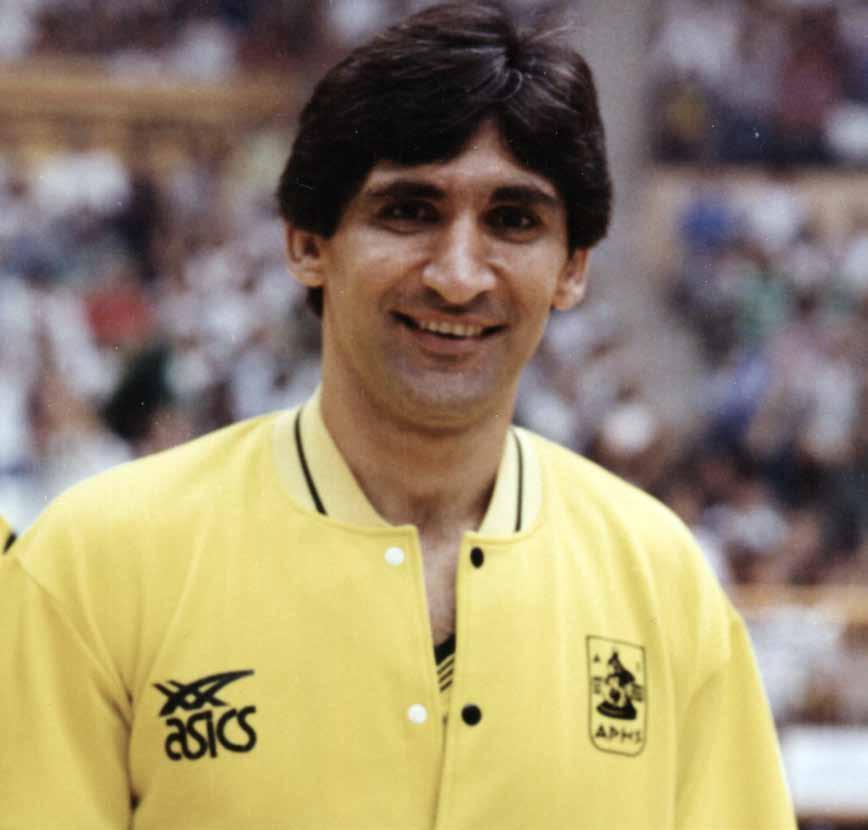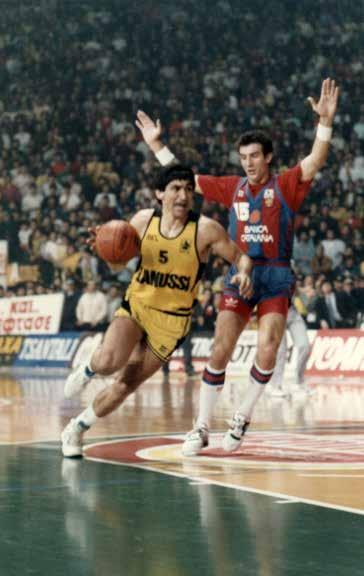
7 minute read
PANAGIOTIS GIANNAKIS
Panagiotis
Giannakis
Advertisement
The Greek Dragon I n the history of basketball, there are many cases in which the names of two players go hand in hand as if they were one. For instance, Kicanovic and Dalipagic at Partizan; Slavnic and Kicanovic on the Yugoslavia national team of the 1980s; Solozabal and Epi in Barcelona; Marzorati and Meneghin with Varese; Corbalan and Luyk in Real Madrid; and Gjergja and Cosic in Zadar. And one of the most outstanding cases of this phenomenon is, without a doubt, the duo that saw action in the Greek national team and Aris Thessaloniki during the 1980s: Nikos Galis and Panagiotis Giannakis. Neither of them is from Thessaloniki, but that’s where the most important part of their careers took place. Galis, who is 18 months older than Giannakis, was there first. The son of Greek emigrants to the Unit ed States, he made his debut on December 2, 1979, and finished the season with an incredible average of 33.0 points per game. However, he was not the best scorer in the Greek League that year. That honor belonged to a player from the small Athens-based club, Ionikos Nikaias, for whom Panagiotis Giannakis finished with a 36.5-point average! Giannakis was already a relatively well-known player. I saw him for the first time in Split during the Mediterranean Games, where in the final, he led Greece to victory over a solid Yugoslavia team 85- 74. That Yugoslav team had names like Mirza Delibasic, Mihovil Nakic, Rajko Zizic, Andro Knego, Ratko Radova novic, Ivica Dukan, Misko Maric and Boban Petrovic, but the Greeks were better. Thanks especially to 34 points from the hands of Giannakis. Curiously enough, Giannakis recorded his best scoring performance in the Greek League – 73 points! – in a game against Aris in 1981. That was just one more reason for Aris to sign him. Some years later, Aris man aged to get Galis and Giannakis together, and that was the birth of one of the most famous duos in the history of European basketball. Once they were together, the dominance of Aris in Greece started right away and led the team to seven straight titles. In Europe, which be gan using the Final Four to decide the champion starting in 1988, Aris reached the final stage three straight times. But they never made it to the title game, finishing fourth twice and third once. Defeats in Ghent in 1988 against Milano and Partizan were frustrating. One year later the same thing happened in Munich, where Maccabi was better in the semis despite 25 points by Galis. In the game for third place, Aris beat Barcelona 88-71 with 36 points from Galis and 22 by Giannakis. The third time wasn’t a charm either, in Zaragoza in 1990. First, Aris lost to Barcelona and later to Limoges, despite 43 points from Galis. Consolation in Turin This great duo finished their career together in Aris without any international titles. Galis decided to join Panathinaikos in 1992, but Giannakis stayed with Aris one more year. In that 1992-93 season, he managed to win with Aris the Saporta Cup, FIBA’s secondary tro phy at the time, by beating Efes Pilsen 50-48. The final was played on March 16 in Turin, Italy, in front of 7,000 mostly Aris and Efes fans. At the time, the diplomatic re lationship between Greece and Turkey was not healthy and the game turned into one of the biggest scandals in the history of European basketball. There was a battle in the stands, with seats being turned into weapons.
101 greats of european basketball Panagiotis Giannakis
Four Efes players and even the FIBA delegate wound up in the hospital. In a tense and ugly game, Efes was close to victory, but in the final minutes the experience of Roy Tarpley (19 points, 18 rebounds) and Giannakis himself, despite only 2 points, allowed Aris to take the win.
Galis, meanwhile, was not lucky with Panathinaikos either. He managed to play in the 1994 Final Four in Tel Aviv, but in the end, he retired without fulfilling his dream of winning the continental crown. Giannakis was a bit luckier. He followed Galis’s footsteps and signed for Panathinaikos in 1994, after a season with Panio nios. His first attempt at the Final Four with Panathinaikos, in Zaragoza in 1995, ended like the others with Aris. But on the second try, in Paris in 1996, Giannakis finally managed to lift the EuroLeague trophy. In a dramatic and historic game, marked by some serious mistakes by the referees and the officials’ table, Pana thinaikos won 67-66. Giannakis, at 37 years old, played 38 minutes and scored 9 points. His dream came true. That same summer he played at the 1996 Olympics in Atlanta and then retired. Behind him were 351 games with the Greek national team and 5,309 points, which remains the record. In the Greek League, he scored 9,291 points, the third-best mark of all time. A miracle in Piraeus What Galis and Giannakis didn’t manage to do with Aris, they accomplished with the national team at Euro Basket 1987. It was played in the then-new Peace and Friendship Stadium in Piraeus. Giannakis had played his first EuroBasket in 1979 in Turin and finished with a sol id average of 7.8 points. Two years later in Prague, his average was already 10.2 points, and in 1983 in Nantes, he climbed to 15.3. In the 1986 World Cup in Spain, he had 17.3 points per game. Giannakis’s most brilliant moment occurred on June 14, 1987, when Greece, in the game known as “The Miracle of Piraeus”, managed to defeat the USSR in overtime 103-101 to claim the Eu ropean title. Galis played all 45 minutes and scored 40 points, but the leadership, vision, assists and security that Giannakis gave to his teammates turned him into the other hero of the game. Two years later, in Zagreb, Greece again reached the EuroBasket final but lost to Yugoslavia. At the 1990 World Cup in Argentina, Gi annakis averaged 26.0 points, in the 1991 EuroBasket he scored 19.8 and in the 1993 EuroBasket, it was 19.3. Giannakis was a point guard, so by definition, he was supposed to be a player that helped the others. But his great abilities turned him into a great scorer. Since Galis could also play point without problems, often they switched positions during a game, causing confusion for the opponent. Giannakis stood taller than Galis, had a good outside shot, penetrated well and was also a solid rebounder. But most of all, Giannakis was a lead er. In decisive moments, his teammates turned to him because his hands were like a safe around the ball, and he could also score. He was a life insurance policy for his teammates and coaches. He was also a sportsman of true excellence, without a single stain in his résumé, a player loved by all, even by rivals, who respected his professionalism.
EuroBasket history-maker Panagiotis Giannakis is the only man in basketball to have been European national champion both as a player and coach. Svetislav Pesic did it at the club level with Bosna in 1979 as a player and with Barcelona in 2003 as a coach. However, at the international level, only Giannakis has EuroBasket titles as a player (1987 Piraeus) and as a coach (2005 Belgrade).

next stop would be Maroussi, but in 2004 he was back on the national team bench for the 2004 Olympics in Athens. Greece finished fifth, but the following year, in Belgrade, it won the European title. In 2006, Giannakis led Greece to a historic semifinal victory over Team USA at the World Cup in Japan but had to settle for the silver medal after falling to a great Spain team in the final. From 2008 to 2010, Giannakis coached Olympiacos and reached the EuroLeague Final Four twice. In 2009 the Reds fell to Panathinaikos in the semis in Berlin, and in 2010 Olympiacos lost against Barcelona in the title game in Paris. He also helped the Reds snap a long title drought at home with the 2010 Greek Cup.
In 2008, Giannakis was rightfully selected by Eurole ague Basketball among the 50 Greatest Contributors to the first 50 years of the European club competitions. He is Panagiotis Giannakis, the dragon of Greek basketball.
After putting an end to his brilliant playing career, Giannakis turned to coaching the Greek national team and already at EuroBasket 1997 in Barcelona, he led the team to the semifinals. He did the same one year later at the 1998 World Cup in Athens. After that, he coached Panionios and stayed there until 2002. His










